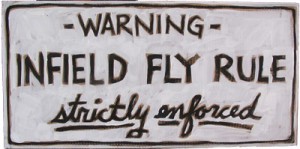Repeal the Infield Fly Rule
Posted on October 5, 2012

The world is going to hell in a hand basket. The stock market just crashed as if Congress allowed the President to default on our debt payments. Europe is in the same shape financially as it was in 1946.
So why am I focused on the Infield Fly Rule?
I don’t know. I thought it would be a pleasant diversion from the negative news we see every day.
So, for those of you who don’t follow baseball, the Infield Fly Rule, according to Wikipedia, is: “The infield fly rule is a baseball rule that is intended to prevent infielders from intentionally dropping pop-ups in order to turn double plays (or triple plays). Without this rule, a defense could easily turn a pop-up into a double play when there are runners at first and second base. If the runners stay near their bases to tag up, the defense could let the ball drop, throw to third base and then to second, for a force-out at each base. If any of the runners stray too far from his base, the defense could catch the pop-up, and double-off any runner that failed to tag up. When the rule is invoked, the batter will be out (and all force plays removed) regardless of whether the ball is caught, thus negating the possibility for multiple outs.”
The Infield Fly Rule was created in 1895, when Grover Cleveland served the second of his two non-consecutive terms. Cleveland was a Bourbon Democrat, which meant he supported classical liberalism (unlike the current liberalism), which meant he supported low tariffs, opposed subsidies to farmers and supported a conservative monetary policy. Cleveland was also a political reformer who had a sterling reputation as being incorruptible, which didn’t matter politically when the Depression of 1893 hit. People care first about jobs in just about any era.
In 1895, Cy Young won 35 games and the Baltimore Orioles won the National League championship. Baseball was a different game back then. Batters didn’t wear helmets. Home runs were uncommon. Gambling was prevalent and gamblers really had an out-sized influence on the game. And there was no World Series, as the American League hadn’t come into being.
You could see why the Infield Fly Rule was installed. Progressives were just starting to organize in response to the Gilded Age. Populist anger, especially among farmers towards the New York banking elite, was fomenting, as the Democratic Party was being torn asunder by the pro-business wing and the free money (think William Jennings Bryant and a cross of gold) wing were at odds.
It probably seemed unfair that infielders could take a pop-up and create a double or triple play out of it, especially to gamblers who had a lot riding on the game. The Infield Fly Rule was created to limit the risk of such an incident.
But I think it is time to re-evaluate the rule. What about moral hazard? Doesn’t such a rule limit the entrepreneurship of the second baseman or shortstop who has to balance the risks with the rewards of going for two birds in the bush instead of one in the hand? Doesn’t the rule take away some of the excitement of the game?
I say let the players play. Let the marketplace work. Repeal the Infield Fly Rule and put some moral hazard back in the game.
